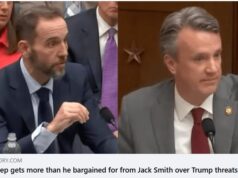(Just remember, the effort to weaken EPA and/or strip it of its power to keep our air and water clean is all part of the right-wing, Dirty Energy, corporate assault on our environment and our democracy. It’s extreme and also extremely dangerous. – promoted by lowkell)
cross-posted from Main Street Insider
A couple weeks ago, we looked at new regulations on greenhouse gases (GHG’s) being imposed by the Environmental Protection Agency (EPA). This week’s episode focuses on a bill proposed as a response to these new regulations by House Republicans who oppose the EPA’s efforts. Contrary to what the title of the bill would suggest, this proposal has absolutely nothing to do with taxes. In fact, aside from the title, the word “tax” does not appear once in the text of the bill. The actual language of the bill shows that the real intent is to strip the EPA of power in the area of GHG’s and leave any decision making to Congress.
It should be noted that the EPA has been regulating air pollutants for over 40 years (just missed the 40th anniversary last December). Though regulating GHG’s is new, thanks to a 2007 Supreme Court ruling that declared GHG’s to be air pollutants, this type of EPA authority has been the status quo for a long time.
90 Second Summaries: Season 2, Episode 9
H.R. 910: Energy Tax Prevention Act of 2011
Introduced 3/3/2011
Sponsor: Rep. Fred Upton (R-MI6)
Click here to download this summary (pdf)
Cosponsors: 82 (3 Democrats, 79 Republicans). Full list at http://thomas.loc.gov/cgi-bin/bdquery/z?d112:HR00910:@@@P
Status: Passed Energy & Commerce Committee on 3/15 by a 34-19 margin, mostly along partisan lines. Expected to reach House floor and pass through full chamber before April recess. Ultimately faces a likely presidential veto.
Senate Companion: S. 482, same title. Sponsored by Sen. Inhofe (R-OK). Unlikely to receive action on its own, but could be attached as a rider on another bill.
Purpose: In 2007, the Supreme Court ruled greenhouse gases (GHGs) to be drivers of climate change and this subject to regulation under the Clean Air Act. In response, the EPA issued a series of rules requiring emission permits for large industrial pollution sources. The first phase of regulations took effect in January 2011 and will be gradually expanded over time. Fossil fuel energy companies, industrial polluters and Republicans are vehemently opposed to such action, and vow to halt implementation by any means necessary. H.R. 910 and its Senate companion represent their foremost effort to date.
Summary: This legislation would halt EPA regulation of greenhouse gases through the following mechanisms:
• Declaring that greenhouse gases cannot be included in any climate change-related EPA regulation;
• Redefining the term “air pollutant” to exclude GHGs for purposes of addressing climate change;
• Repealing all prior EPA rulemaking related to the regulations in question, including the rule expressing the scientific finding that GHGs are a major cause of climate change and endanger human health;
• Ensuring that Congress has sole authority to set GHG standards for light-duty vehicles from 2017 on.
The bill does preserve the option for states to impose regulatory measures of their own, and leaves in place the recent agreement on auto and truck emission standards through 2016.
Note: Notwithstanding the bill’s title, the EPA regulations are in no way an “energy tax” in the direct sense. Supporters of H.R. 910 and similar legislation assert that GHG regulations will indirectly raise prices due to the cost of compliance and thus harm the economy. However, it is unclear whether the economy will suffer as a result; similar arguments used about the Clean Air Act sulfur regulations in 1990 proved to be unfounded, as benefits are estimated by the EPA to exceed costs by roughly a 30:1 ratio.
Supporters: Republicans and some rural Democrats, conservative think tanks and Tea Party organizations, etc.
• Supporters are fundamentally pitted against any environmental regulations that may drive up business costs and energy prices. They see these EPA rules as a massive bureaucratic overreach, despite repeated Supreme Court rulings to the contrary. Furthermore, many believe human-caused climate change is simply not occuring.
Opponents: Obama Administration and most Democrats, environmental and public health organizations, Vote Vets, etc.
• Opponents generally see EPA regulation as a suboptimal but necessary alternative to comprehensive climate legislation. As Congress seems exceedingly unlikely to pass such a bill in the near future, they view these measures to control GHG emissions as a crucial step to not only prevent catastrophic climate change, but to foster sorely needed development of clean energy sources.
Further links
Main Street Insider summary of the EPA regulations: http://www.mainstreetinsider.org/90secondsummaries/?p=249
Full bill text: http://www.govtrack.us/congress/billtext.xpd?bill=h112-910
Section-by-section summary, via Inhofe staff: http://epw.senate.gov/public/index.cfm?FuseAction=Files.View&FileStore_id=ddf3651c-02e2-4dde-bf10-5cb9ca357c04
Committee roll call vote results: http://bit.ly/gSQthC
EPA study on prospective effect of 1990 Clear Air Act Amendments: http://www.epa.gov/air/sect812/prospective2.html
Energy and Commerce Committee Markup: http://www.youtube.com/watch?v=vSvnzArFbBs



![Video: Former Eastern District of VA Federal Prosecutor Gene Rossi Asks, “Is Donald Trump going to be the lead counsel in that prosecution [of Jim Comey] and do the opening, closing and rebuttal? I pray that he does!”](https://bluevirginia.us/wp-content/uploads/2025/09/rossiedva-238x178.jpg)






![[UPDATED 1/29/26] Audio: Sen. Tim Kaine Talks to Blue Virginia About His “Five-Point Plan” to Fight Trump’s Orban-Like Assault on US Democracy; Civil Disobedience a la MLK Jr.; Trump’s Bogus “Energy Emergency”; the Crucial Importance of the 2025 VA Elections; etc.](https://bluevirginia.us/wp-content/uploads/2025/02/kaineinterview2-100x75.jpg)
